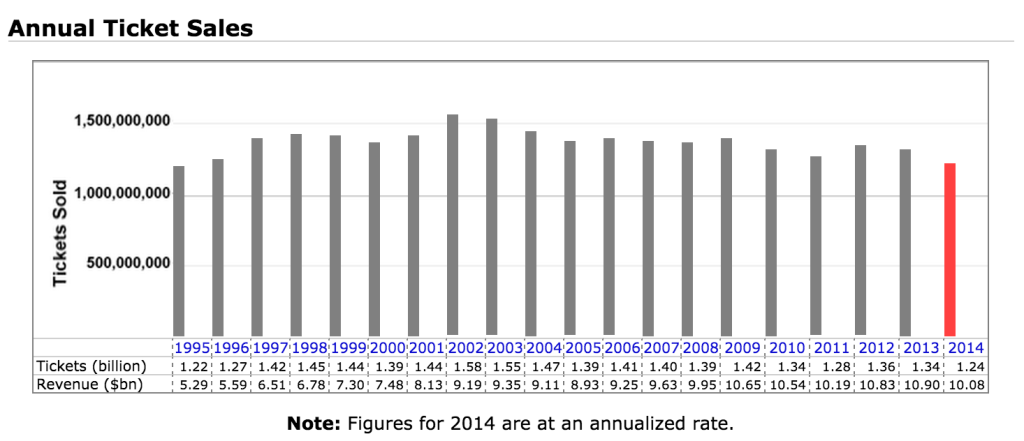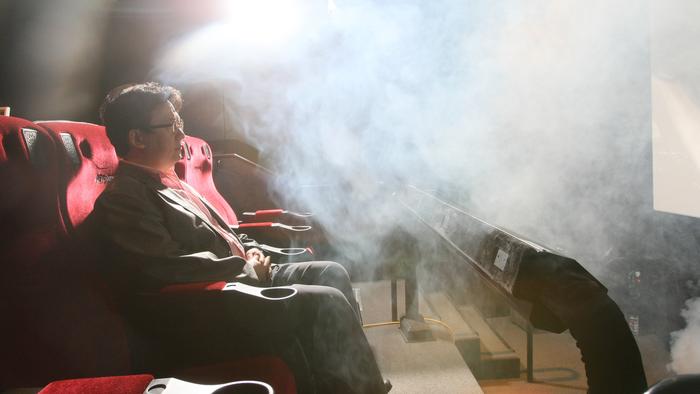Everywhere is white with snow and the wind is howling. You are tumbling down the icy mountain wall with three baby penguins and a penguin egg. With cold-blast air blowing in your face, you are neither in Antarctica nor in day dreaming. You are in movie, a 4D movie.
When the newborn penguin breaks out of the egg shell, the seats jerk. Then a voiceover comes along, “It’s the miracle of birth.”
While still going through the “post-Avatar” age, the age of 3D revival, the movie theaters are not satisfied with the declining box office and are trying the new gimmick, 4D technology, to get more people into the theaters.
As a leading role of pushing the 4D system, Seoul-headquartered CJ group opened a 104-seat 4D theater with its partner Regal Cinemas in LA Live this June, the first of the kind in the United States. “We opened the first auditorium in L.A. because it’s the place where Hollywood is located,” says Yassamine Wahab, marketing director for CJ 4DPlex. CJ 4DPlex, a branch of conglomerate CJ Group, is the company that designed 4D.
CJ Group and its partner have confidence in drawing crowds with the 4D technology. “It makes the movie, the viewing even more realistic and it puts you in the middle of the action that makes you feel exactly how the characters feel,” says Michael Roth, VP of the communications for AEG.
It shakes. It rains. It smokes. It blows. It smells. It lights. It bubbles. It also cashes in.
The 4D theater in Downtown L.A. is outperforming traditional movie theaters, according to Variety. For instance, “Transformers: Age of Extinction” generated $105,016, an 138 percent more than the national average of $44,054, during its first thirteen days. “Dawn of the Planet of the Apes” performed even better, taking in $94,247 during the first 13 days, 145 percent more than the industry average. “The one theater that equipped with 4D system sells out on a regular basis,” Roth says.
Although higher ticket prices certainly give it a higher box office than other regular cinemas, the occupancy rate is still impressive. Regardless of the weekday, the weekend, or the title, it enjoyed an average attendance rate of 63 percent. Most theaters’ attendance rates vary between 10 percent to 15 percent. “It’s beyond expectations. People were very curious about this process, so that they came early to see the showings,” Roth says.
The average ticket price of a 4D movie is $15, about $7 more than the U.S. average ticket price of $8.16. “People understand that there is a premium attached to it, with the technology and all the equipments added,” Roth says.
It’s expensive to build up a 4D theater. There are two different ways of building a 4D auditorium. One is building a 4D auditorium in a newly constructed multiplex, and the other is transforming an existing movie theater into 4D auditorium by renovation. CJ 4DPlex did the latter, the more costly one, to the one in L.A.. It took them about 3 months to install motion chairs and various equipments for environmental effects.
CJ Group told Los Angeles Times, “it costs about $2 million to design and outfit a 4-D theater, with exhibitors covering half the costs.” CJ Group also says circuits quickly recoup their investment because the theaters are so popular.
The 4D auditorium in Hollywood is not CJ Group’s debut. CJ started off its 4D journey home — it showed its first film with 4D effects “Journey to the Center of the Earth” in an 88-seat theater in Seoul in 2009.
With the introducing of 4D “Avatar” in 2010, CJ Group opened three more “4D Plexes” in South Korea. Matthew Patrick, a member of the Academy of Motion Picture Arts and Sciences, explains, “It’s such a trip to another world, so the magic of the world is already so great that this [4D effects] would just add to it.”
CJ’s 4DX is currently running 128 auditoriums in 28 countries worldwide, including Mexico, Korea, China, Russia, the U.S. and Japan. On average, 4D auditoriums generate 3 times as big as the box office revenue of 2D or 3D general formats. And the occupancy rate of 4D theaters is 10 to 30 percent higher than that of general auditoriums, Wahab says.
The South Korean company is not alone. In Australia, Merlin Entertainments runs a 4D cinema at the Sydney Tower Eye where people can have the views for real on the top of the observation deck during a short film that shows off the city’s sights.
An Indian shopping mall, Sector 4D Shopping Centre, installs an even more extreme effects in the cinema, with seats moving in all directions, including free-falling, vibrating and flight simulation.
Comparing with “Avatar” igniting the global excitement about 3D screens, — in 2010, the number of 3D screens installed more than doubled from 16,339 to 36,242, an increase of 121.8 percent — 4D theaters still have a long way to go.
4D movie theaters may need another “Avatar” to really thrive. “You gotta have the right movie, a great movie,” Patrick says.
Before going wide release in regular cinemas, 4D cinemas have been running at theme parks and amusement parks around the world for more than two decades. “Theme park is a great place for 4D, because everybody is looking for something different from regular cinemas, something adventurous,” Patrick says. When watching 4D “Shrek” at Universal Parks, moviegoers are shaken by moveable seats when Shrek is running, and sprayed with water mist in the face when Shrek is sneezing.
CJ Group insists it isn’t building theme park rides, and says its theaters offer a much richer movie experience, according to Los Angeles Times.
“People may pay for the shaking seats, the smells and the bubbles once or twice, but I don’t know whether people are willing to spend money to do it five times,” Patrick says.
3D used to be very painful to watch. “We didn’t expect that 3D was gonna become this big,” Patrick says. With the technology getting so much better, people don’t get the headaches as they used to and have a better experience with 3D screens and glasses. 3D films stopped scaring people away by the better technology.
Likewise, the 4D technology has to be improved to secure audience for the future. And it’s tough.
The shaking chairs have been seen even before the 4D movies at theme parks. That is the movie “The Tingler,” an American thriller film. It was more than 50 years ago when they made certain seats shake a little bit and certain people were screaming at the theaters. “They weren’t expecting it.” Nowadays people won’t be scared off by moveable seats, but how many times can they get excited because of it?
The smell is very tricky to be programmed into the movies because certain smell is too strong and unpleasant to people. And fog is hated by most directors, says Patrick. It takes a long time to get rid of fog. There are two kinds of fog can be used in a 4D auditorium — one is very low on the ground, and the other is spreading everywhere. Fog spreading everywhere may make the screen darker, however, filmmaker are always trying to make the images as bright as possible.
Often times, 4D films come a little bit later than 2D or 3D films and normally it takes at least 16 days for 4D editing. It can be a problem — people want to see the film in the first two weeks and they don’t care to see the 4D version after all the excitement is gone.
The way to solve the “lag problem” is to cooperate with local studios to launch a film with 4D for the first time in the country. CJ 4DPlex has tried once. It invited the director Alponso Cuaron and had “4DX premiere” with ‘Gravity’ in Morelia, Mexico in 2013.
“The movie theaters did 3D to try to fight with television, and now they are having the same problem — they are raising the ticket prices but they are not getting more people into the theaters,” says Patrick. The cinema with a new dimension burns with an ambition to reverse the longtime decline in cinema attendance in the U.S..
But a whiff or a strobe light doesn’t make a great movie that attracts millions of people to the theaters. “You have to have really good stories that people want to see in the big screen — stories always come first, in stead of the format.”


Leave a Reply
You must be logged in to post a comment.